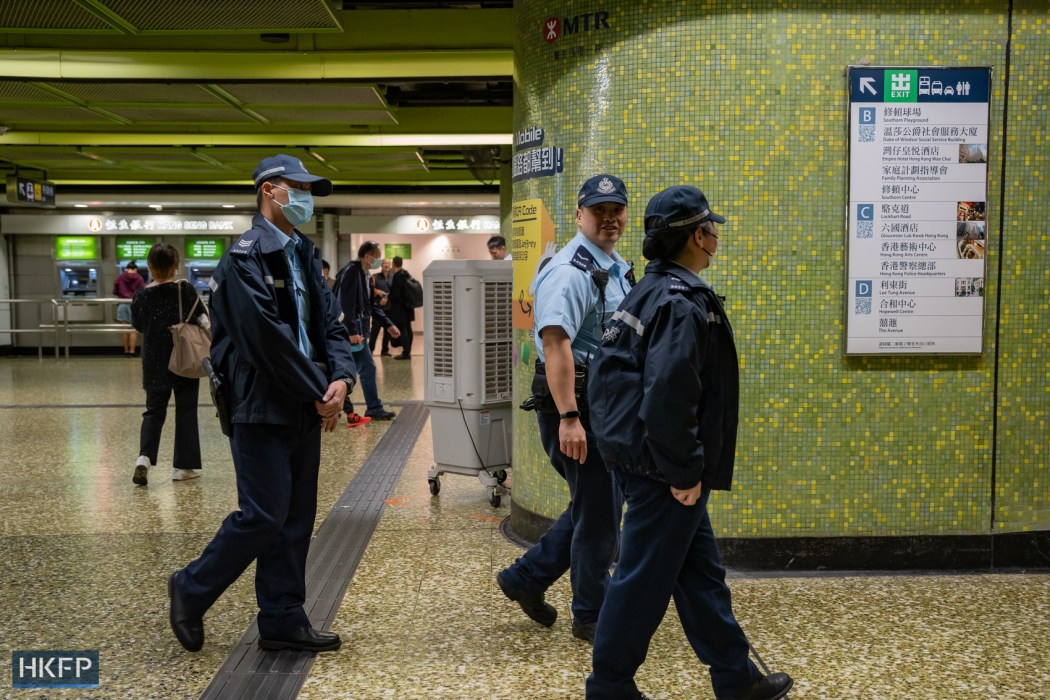A total of 161 Hongkongers had their money frozen after trying to transfer it from the city to mainland China via Hong Kong’s currency exchange shops in 2023, the government has said.
Secretary for Financial Services and the Treasury Christopher Hui disclosed the figure in the Legislative Council on Wednesday, adding that a total of 10.7 million renminbi (HK$11.63 million) was frozen.

“With the Customs and Excise Department’s intervention, so far 94 persons requesting for assistance have settled their cases through bilateral negotiation, involving an amount of about RMB6.9 million,” Hui said, adding that it meant those affected had got their money back.
Hui’s remarks came in response to questions from pro-Beijing lawmaker and member of Hong Kong Federation of Trade Unions (FTU) Kingsley Wong, who asked about the regulations of currency exchange shops and how many people had been impacted.

Earlier this year, Wong hosted a press conference revealing that over 130 Hongkongers had sought help from the FTU last year over their funds being frozen, HK01 reported. They said their money had been frozen by mainland Chinese police after trying to send it to China via currency exchange shops.
Wong said that after receiving an amount in Hong Kong dollars, the shops would transfer the same amount in renminbi (RMB) to mainland Chinese bank accounts before transferring to the clients’ account in China. However, if the shops Chinese accounts were suspected of being involved in money laundering, illegal gambling or other offences, the receiving account would be frozen too.

Wong added that some victims had even been called to faraway provinces for investigation by Chinese police, and had been worried about their personal safety. He advised Hongkongers to follow bank procedures to send money to China.
‘Underground banks’
Local media outlets reported in 2017 that some currency exchange shops served as “underground banks,” exchanging money between Hong Kong and mainland China as Beijing restricted bank transfers of large sums of money out of China.
“Hong Kong businessmen need Chinese yuan for payroll and purchasing raw materials. Underground banks will provide them with Chinese yuan in the mainland and receive foreign currency to hedge against individuals in the mainland who need to transfer money out,” Lin Jiang, a scholar at Sun Yat-Sen University, told HK01 in 2017.
These underground banks would often help people to set up many bank accounts to evade bank regulations, Lin added.

Oriental Daily reported in 2017 that as Beijing further scrutinised cross-border money transactions and the yuan depreciated, more Chinese transferred their money out of the country via currency exchange shops.
The FTU’s Wong said Hongkongers chose to transfer money via such shops because it was convenient, swift and the exchange rate was more favourable than at banks.
Money laundering
In recent years, Hong Kong authorities have crackdown on several currency exchange shops accused of operating without a license or suspected of money laundering.

In October 2023, four people were arrested for allegedly laundering up to HK$600 million through a currency exchange shop, shell companies and many bank accounts, local media reported. Those arrested were thought to have used 12 accounts to handle over 1,800 transactions with unrelated entities, including food wholesalers and shoe traders.
In 2022, police arrested an employee of a currency exchange shop on suspicion of laundering HK$350 million in four years with 23 bank accounts.
Hui said on Wednesday that the public should choose licensed money services providers and be aware of the risks associated with remittance, adding that authorities would coordinate with mainland Chinese departments to help victims.
Support HKFP | Policies & Ethics | Error/typo? | Contact Us | Newsletter | Transparency & Annual Report | Apps
Help safeguard press freedom & keep HKFP free for all readers by supporting our team

LATEST FROM HKFP
HKFP has an impartial stance, transparent funding, and balanced coverage guided by an Ethics Code and Corrections Policy.
Support press freedom & help us surpass 1,000 monthly Patrons: 100% independent, governed by an ethics code & not-for-profit.










